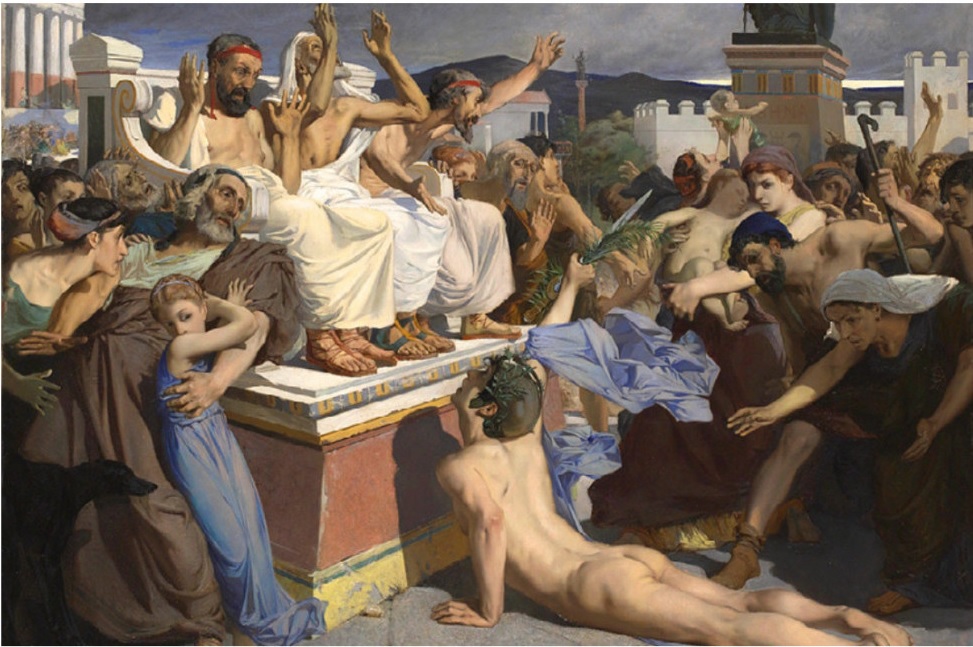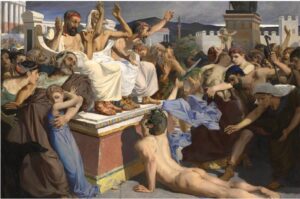The First Marathon run ever is about The Legend of Pheidippides. No one knows exactly how the story was born there are several interpretations and the overall message is about human perseverance and victory. The suffering of Pheidippides – his hazardous marathon is historical and whether it’s true or not it’s still a good and uplifting story.
The Battle Of Marathon
It was after a battle 490 years before our time on the Attic plateau, northeast of the small town of Marathon in Greece. The battle was between the Greeks and the Persians. The Greeks say they fought for their new concept: freedom against suppression and slavery and free political life.
The Battle has been violent and the outcome was quite unexpected. It was early in the morning when a small Athenian army defeated the Persians. Later on, that day The Greek soldier Pheidippides, who was a soldier in the messenger troops, ran from the battlefield about 40 kilometers to Athens to tell the Greeks about the victory over the Persians.
Pheidippides Pronunciation – Joy You, We Have Won
The temperature this late summer day was very high, so the heat from the scorched landscape made the run to a sweltering inferno. After having reached his compatriots, he said the words: “joy you, we have won”, then he collapsed and died from exhaustion. There is some doubt about the veracity of this story, but it has given birth to a legend and the concept of the Marathon.
Pheidippides marathon
This original epic run of Pheidippides continues to inspire runners today. Since the Olympics rise again in 1896, where the Marathon race event was on the program for the first time, it has been regarded as the ultimate endurance test.

The Marathon Distance Changes
At that time, the race was about 40 kilometers. Already the year after, the world’s first City marathon was established. It was Boston Marathon, which today is one of the most popular marathon races in the world.
At the Olympics in London in 1908, arise the current distance of 42,195 m, because the English royal family wanted to look down on the start line from their balcony! From the first OL marathon in recent times, it took many years before the race really reached out to the masses.
Until then, it has been a wild and unattainable distance for ordinary people and as an athletic discipline, it was more anonymously compared with the exercises inside the Olympic stadium. The first 41.8 km was out on the roads, with few spectators – the last 400 meters took place inside the stadium.
Frank Shorter
Maybe the modern way of long-distance running was born when the American runner Frank Shorter shows up in the Olympic stadium to the last 400 M at the Olympic Games in Munich 1972 and became a surprising winner.
It was a kind of revolution on the marathon distance when he won the Olympic gold medal. People in the US went out on the streets to run immediately after this event. Until then, long-distance running was known from tough East Europeans with exhausted facial features.
However, millions of TV viewers saw a smiling relaxed runner running alone up to and into the stadium and the American TV reporter yells, “come on Frank you won it”. The Americans did not believe their own eyes.
Was it possible to run 42 kilometers, and still look great? Frank Shorter’s Olympic victory was a great breakthrough perhaps in the same way as Pheidippides’ triumph race on the Greek mountain trails, and many people say he became the father of the modern running boom.
Final Thoughts
So, from being an unattainable distance reserved for a small group of the toughest, it has become possible for virtually anyone at all levels to participate in the marathon distance. The Myth of Pheidippides is still living and there is a statue of Pheidippides along the Olympic marathon route in Rafina, Greece.
If you are interested in the Marathon legend like me, I hope you like this page and if you have any questions about this topic or want to leave your own Personal review, please leave a comment below.





